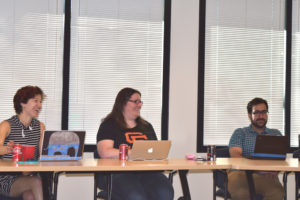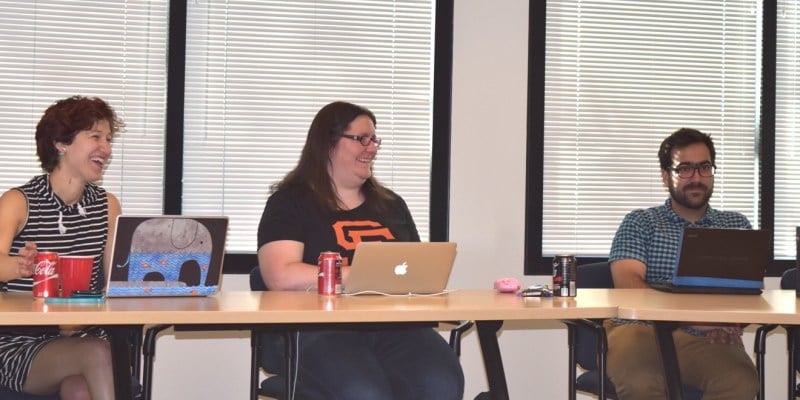
In its second official meeting Wednesday, the Graduate Student Council addressed flaws in the Voluntary Student Organization (VSO) funding guidelines and proposed outside outreach committee opportunities.
Faulty funding guidelines
A recent VSO request from the Stanford Black Biosciences Organization sparked discussion over the efficacy of the current funding committee guidelines. These guidelines were revised to fit the stringent budget two months ago, according to GSC and funding committee member Isa Rosa from the School of Engineering.
The Black Biosciences Organization requested funding for an informational session with an expected attendance of 15. The funding committee denied the group funding because the current funding guidelines say that the GSC does not fund informational sessions and the session was not planning to accommodate for a wide audience.
Rosa said that the info session addressed internal elections for the group and that the GSC only funds events that are open to all graduate students.
“There are over 200 VSOs on campus,” Rosa said. “If each VSO came and asked for funding and got it, we would have no money left for things that accommodate more grad students. We want to fund events that are going to have a bigger impact.”
The recommendation to deny funding raised questions from GSC member Megan Conlon from the natural sciences division of the School of Humanities. Conlon argued that the info session would be aimed at raising awareness for the group and that denying them funding deprived the group of the opportunity to put on an event to attract more members.
GSC members Juan Lamata, Ph.D. candidate in English and Gregor Quack, Ph.D. candidate in art and art history agreed with Conlon, saying that the guidelines should be revised to allow groups to hold info sessions that may help them with outreach.
Representatives from the organization were not present at the GSC meeting. Rosa said that the funding committee invited them to come, but representatives were not interested in attending after their request was denied.
Returning GSC member Gabriela Badica from the division of Iberian and Latin American cultures said that it would be difficult to come to a decision without representatives present but that groups who were denied funding through the committee should feel welcome to request funding during GSC meetings.
“Anyone can always come ask for things, even if it’s against the guidelines,” Badica said.
Co-chair Rosie Nelson from the School of Education recommended that the funding committee meet to discuss changing guidelines and that the GSC should check these recommendations at its next meeting.
According to GSC and funding committee member Melanie Malinas from the department of biophysics, the new funding committee has not had formal training yet, but will convene next Tuesday.
The GSC approved funding in full for the Queer Grad Women’s request for their Open Dyke Night, the Asian American Student Association’s request for a barbecue mixer, Stanford Chinese Sing’s request for for their second anniversary concert and the Taiwanese Student Association’s request for their farewell event.
New roles
GSC Co-chairs presented a range of other campus leadership committees in which GSC members may represent the council.
Co-chair Jennifer Hill, Ph.D. candidate in sociology, offered a position as the GSC delegate for Faculty Senate.
Former GSC Co-chair Terence Theisen from the School of Medicine said that he hopes the new delegate will restart the tradition of presenting GSC matters to the senate once per year, a practice which has been abandoned in recent years.
Additionally, Hill said a GSC member should be a liaison for the ASSU Legal Counseling Service, a forum students may use to ask legal questions.
A GSC member is also encouraged to sit on the Graduate Housing Advising Committee (GHAC). GHAC is composed of Residential and Dining Enterprise leaders, graduate student housing representatives and five graduate student representatives. Graduate student representatives are appointed through the Nominations Commission.
According to former GSC member and current secretary David Fan-Chung Hsu from the School of Engineering, the GHAC has a powerful say in decisions regarding housing for graduate students and joining the committee would help increase the GSC’s voice in improving housing decisions for graduate students.
Hill mentioned positions on the Health Insurance Advisory Committee as well as the Mental Health and Wellbeing Committee. Both roles would involve meeting with Vaden directors as well as Counseling and Psychological Services (CAPS) to discuss graduate student healthcare.
Finally, Theisen encouraged the chairs to reach out to executives and University administration to work on Long Range-Planning, a new initiative to improve administrative transparency and address necessary University changes in the coming decade.
Hill and Nelson stressed the importance of taking these roles seriously.
“When you take on these roles, you are committed to going to these meetings and reporting back to us as well as representing the GSC and vice versa,” Hill said.
The co-chairs themselves, as well as the financial officer, will stand as representatives on the Executive Committee, which brings together GSC leaders, Undergraduate Senate and ASSU Executives. These meetings are open to the public.
Hill also said she would sit as the GSC representative on the Stanford Student Enterprises (SSE) board of directors, which oversees financial planning.
Logistics
Nelson and Hill noted that the first new GSC administrative office hours were a success with six student attendees. Hill said discussion centered around shortcomings of health policy and CAPS, lead by Vaden Director Ronald C. Albucher.
Rosa and Lamata said the GSC survey task-force is working to compose a survey to be distributed to all graduate students with questions of social concern for the GSC to address. The GSC has not produced a comprehensive survey covering a wide array of issues since 2007, according to Rosa. The task force plans to release the survey by the end of the quarter.
According to Nelson, the GSC’s website is still down due to problems with updates, but in the interim there is a stand-in website through SSE.
Contact Gillian Brassil at gbrassil ‘at’ stanford.edu.
